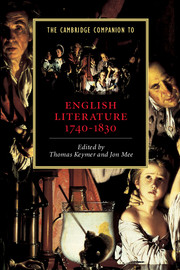Book contents
- Frontmatter
- Part I Contexts and modes
- 1 Readers, writers, reviewers, and the professionalization of literature
- 2 Criticism, taste, aesthetics
- 3 Literature and politics
- 4 Literature, national identity, and empire
- 5 Sensibility
- 6 Theatrical culture
- 7 Gothic
- Part II Writers, circles, traditions
- Index
- Series list
5 - Sensibility
from Part I - Contexts and modes
Published online by Cambridge University Press: 28 May 2006
- Frontmatter
- Part I Contexts and modes
- 1 Readers, writers, reviewers, and the professionalization of literature
- 2 Criticism, taste, aesthetics
- 3 Literature and politics
- 4 Literature, national identity, and empire
- 5 Sensibility
- 6 Theatrical culture
- 7 Gothic
- Part II Writers, circles, traditions
- Index
- Series list
Summary
The reputation of the eighteenth-century literature of Sensibility1 has never quite recovered from its embarrassing association with displays of unmeasured, extravagant emotion. It was 'excessive'. This was not simply distaste for a fading fashion; these are the terms in which it was criticized by some of its major practitioners, and they offer a key to this highly formulaic, but inherently unstable, kind of writing. Consider three scenes. In the first, a father enters with his dead daughter in his arms:
Howl, howl, howl! O! you are men of stones:
Had I your tongue and eyes, I'd use them so
That heaven's vault should crack. She's gone for ever.
I know when one is dead, and when one lives. . . .
I might have sav'd her; now she's gone for ever!
Cordelia, Cordelia! Stay a little. Ha! /What is't thou say'st? Her voice was ever soft,
Gentle and low, an excellent thing in woman.
In the second, a father confronts his disowned daughter, who has fallen from virtue:
His daughter was now prostrate at his feet. ‘Strike,’ said she, ‘strike here a wretch, whose misery cannot end but with that death she deserves.’ Her hair had fallen on her shoulders! her look had the horrid calmness of outbreathed despair! Her father would have spoken; his lip quivered, his cheek grew pale! his eyes lost the lightening of their fury! there was a reproach in them, but with a mingling of pity! He turned them up to heaven – then on his daughter. – He laid his left hand on his heart – the sword dropped from his right – he burst into tears.
- Type
- Chapter
- Information
- The Cambridge Companion to English Literature, 1740–1830 , pp. 80 - 99Publisher: Cambridge University PressPrint publication year: 2004
- 5
- Cited by

